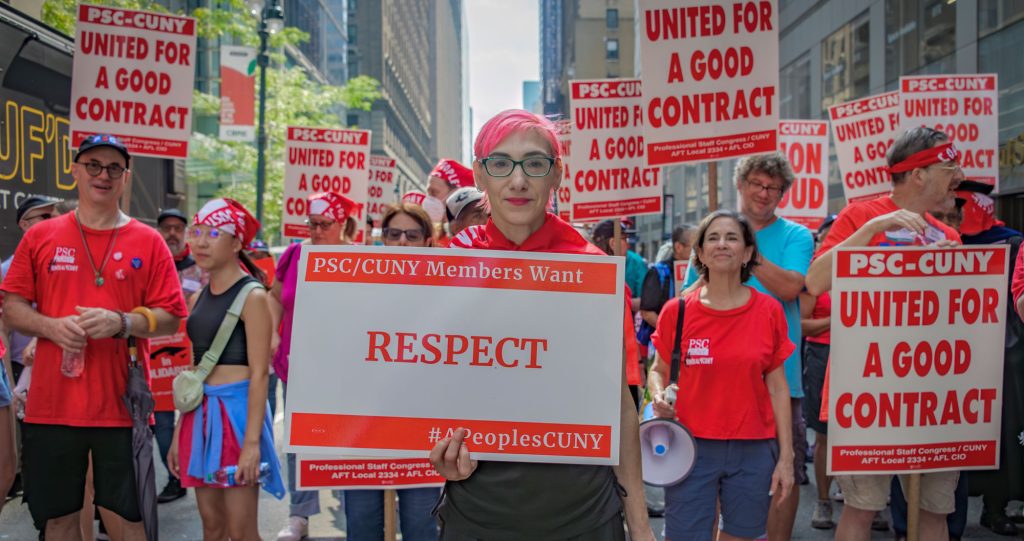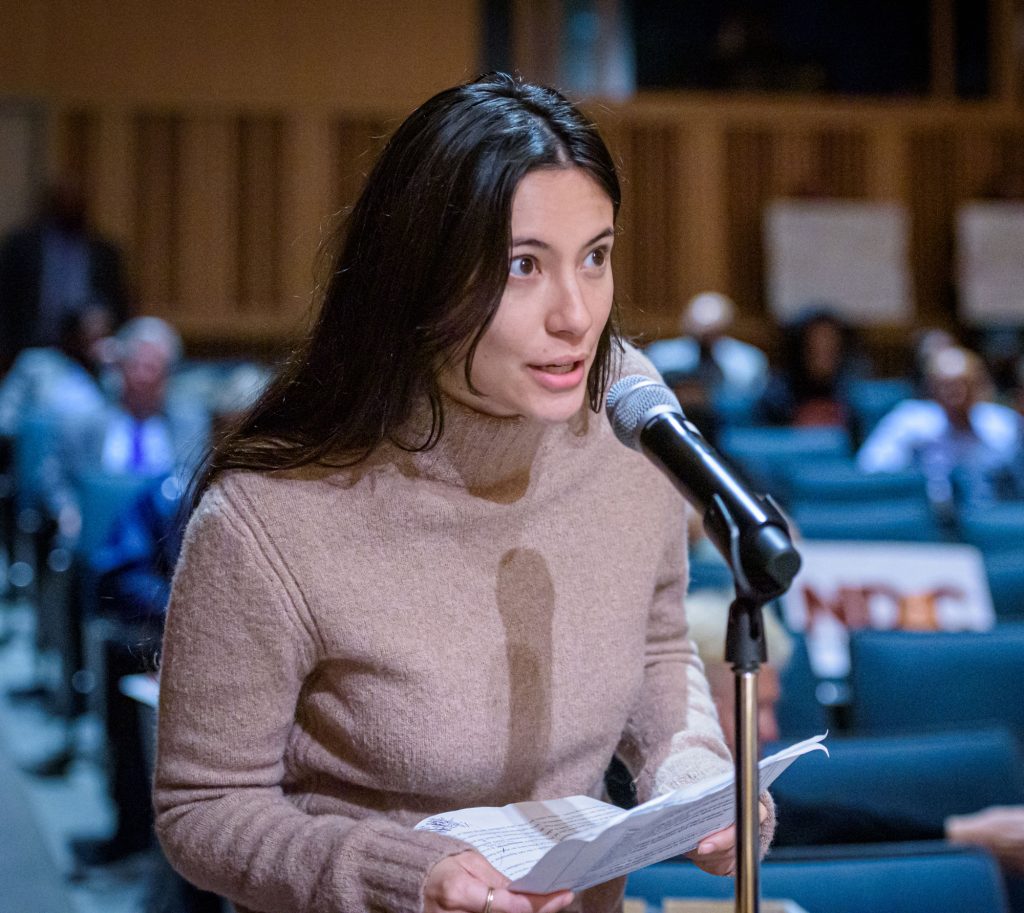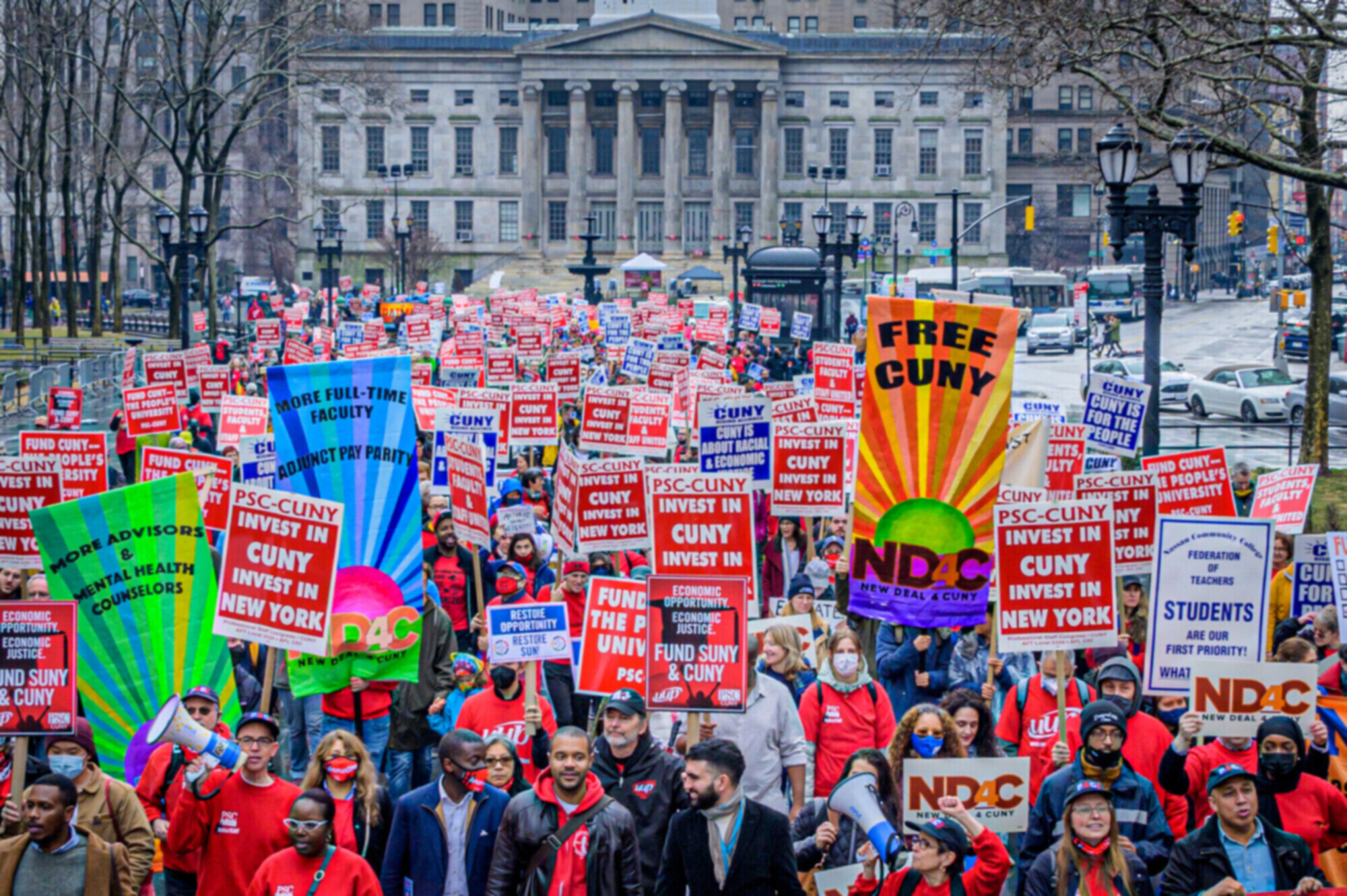
Members across the University are organizing for a fair and just contract. (Credit: Erik McGregor)
Fall is always a busy time for faculty, students and staff at CUNY.
It’s a frenetic time for the PSC as well. Contract bargaining with CUNY is well underway. With more members back on campus, it’s critical to organize and build strong local movements to support our contract and budget campaigns for a People’s CUNY. As this newspaper went to press, campus chapters held visibility actions during Union Week, as a way to kick off the semester. The union will also host an online mass meeting for members in late September, as it did this time last year.
CITYWIDE ACTION
In October and November, the union plans a “Five boroughs in five weeks” set of campus actions to push for a strong and just new PSC-CUNY contract and robust funding of CUNY from the State. These actions will include a demonstration at the October public hearing of the CUNY Board of Trustees.
In December, the semester will culminate with a mass rally for a fair CUNY budget. This whole time, the union leadership continues to engage in contract bargaining that includes having member observers in the room to both put pressure on management and also allow for members to see the process and take that experience back to their campuses.
This means PSC chapter chairs are focusing on including members in the contract fight, achieving health and safety on campus, holding management accountable and building union power on CUNY campuses.
For Karen Weingarten, the newly elected chapter chair at Queens College, a critical tool for winning the contract on campus is hearing from more members on a regular basis.
“One thing I’m personally hoping to accomplish is to increase attendance at our chapter meetings,” she said. “This fall, we’re going to try to hold HyFlex meetings and return to the practice of providing lunch. One of the reasons I’d like to increase attendance at our meetings is that I want to hear from more members about what they would like to see from our chapter and the union: More information about benefits? Regular updates about contract negotiations? Organizing around campus-specific issues like health or safety? The return of unsponsored research, which we lost after the last contract?”

Zoe Hu, the PSC chapter chair at the Graduate Center, wants to address low pay on her campus. (Credit: Erik McGregor)
ADDRESSING LOW PAY
Zoe Hu, the chapter chair at the Graduate Center (GC), agrees. A main focus of her chapter, of course, is organizing to raise pay for graduate student workers. “GC graduate workers still remain some of the lowest-paid PhD students in the country,” she said. But for Hu, winning a just contract means uniting everyone on campus around a common goal, as the chapter did around the no-confidence campaign against the GC administration earlier this year.
“The chapter must unite across its various campuses and titles,” Hu said. “We plan to turn people out for open bargaining, pressing management on making its facilities inclusive and serviceable, and fighting against an austerity logic that persists even after a better-than-usual budget year. Our main goal for graduate students is a $53,000 yearly wage and full funding for all who want it. Some might say this is unrealistic, but $53,000 is the baseline living wage in New York City, according to the MIT Living Wage Calculator.”
FINDING INSPIRATION
Hu said the chapter looked to other academic unions in the private sector for inspiration. “Are we to be satisfied with the notion that a living wage is ‘unrealistic’? Organizing at New York University just won $51,000 for its graduate students,” she said. “And while some may argue that NYU is a private school, we should remember that private universities are limited by their endowments. A public school like CUNY, meanwhile, receives state funding, and $53,000 for what is, in perspective, a small group of graduate students would only be a sliver of a slice of the pie.”
For Weingarten, a big task this year will also be organizing with the other advocacy bodies at Queens College. “I also want to create more collaborations between chairs, the academic senate, and other groups on campus who are working to support faculty governance, which has been increasingly under attack across the country,” she said.
At City Tech, the chapter worked tirelessly last year to build the strength of the chapter’s executive committee. This year, the goal is to invite more rank-and-file activists to become more involved.
“In anticipation of a vigorous contract campaign, we’d like to expand our network of union activists at City Tech by reaching out across titles and departments to bring in new people,” said Carole Harris, the PSC chapter chair at City Tech. “As part of that process, we hope to educate members on the contract. This fall we have two workshops planned on rights and benefits, one for part-time faculty and one for full-time faculty.”
OTHER ACTIONS
Chapter leaders are also organizing lunchtime meetings, film screenings and outreach to different departments on their campuses. “We’re planning to host a screening of The Five Demands, a film about the 1969 student uprising at City College,” said Kathleen Offenholley, the PSC chapter chair at Borough of Manhattan Community College. “We will be inviting BMCC students, staff and faculty, and we will have a question-and-answer session with the film director and some of the activists who participated in the historic uprising. We hope to use this event to inspire, energize and create community as we head into the fight for the next contract.”
Published: September 27, 2023

